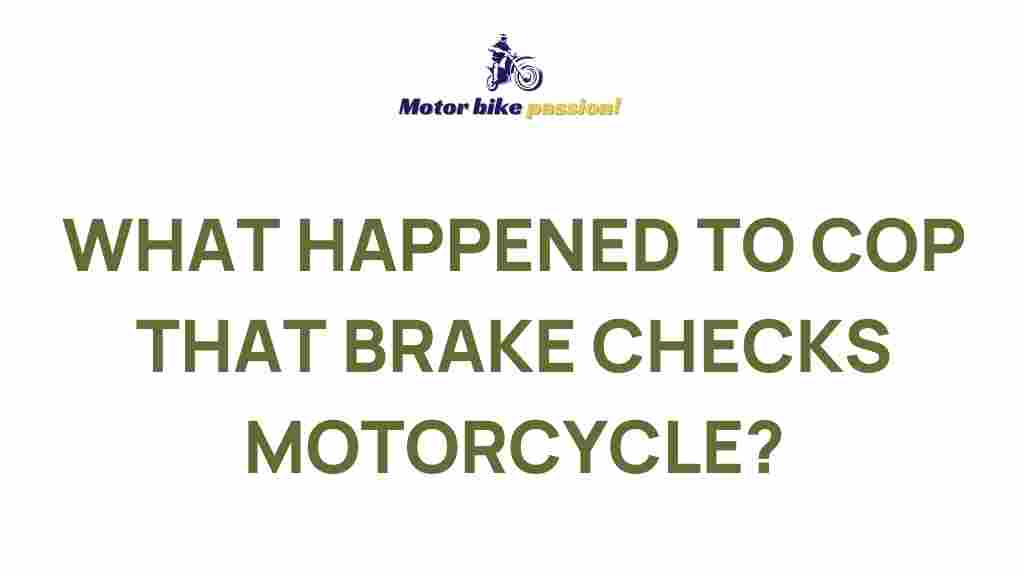The Shocking Consequences of a Cop Brake Checking a Motorcycle
Road safety incidents involving law enforcement can often lead to heated debates and far-reaching consequences. One such scenario, a cop brake-checking a motorcycle, has captured public attention due to its potentially dangerous and sometimes tragic outcomes. In this article, we’ll delve into the ramifications of this act, including the safety hazards, legal consequences, and ethical considerations, while shedding light on how such incidents impact both civilians and law enforcement.
Understanding Brake Checking: What It Means
Brake checking refers to the act of abruptly applying brakes to force the vehicle behind to slow down or stop suddenly. While it’s often seen as an aggressive driving tactic, the stakes are significantly higher when this act involves a cop and a motorcycle. Unlike cars, motorcycles lack the structural protection for their riders, making sudden braking extremely perilous.
- For a motorcyclist: Sudden braking can lead to loss of control, skidding, or even a fatal collision.
- For a cop: This act can result in public scrutiny, legal challenges, and disciplinary action if proven to be intentional misconduct.
To understand why such incidents occur, let’s explore the dynamics of law enforcement interactions with motorcyclists.
Why Would a Cop Brake Check a Motorcycle?
While it’s essential to give law enforcement the benefit of the doubt, there are scenarios where brake checking by a cop might occur. Some possible reasons include:
- Miscommunication: A cop might unintentionally brake-check due to misjudging the distance or speed of the motorcycle.
- Intentional Act: Rarely, it might be a deliberate attempt to assert authority or control.
- Road Rage: Personal emotions, although professionally inappropriate, may lead to such actions.
However, these scenarios are unacceptable given the risks involved. Law enforcement officers are trained to prioritize safety and de-escalation.
The Legal Implications of a Cop Brake Checking a Motorcycle
Legal ramifications of brake checking vary based on jurisdiction and intent. When it involves a law enforcement officer, the consequences can include:
- Negligence claims: If a motorcycle crash occurs due to brake checking, the cop or their department may face lawsuits.
- Violation of conduct: Such acts may breach departmental policies, leading to internal investigations or disciplinary action.
- Criminal charges: If intent to harm is proven, the cop could face charges such as reckless endangerment.
Riders who experience such incidents should document evidence, such as dashcam footage, and consult legal representation. For additional insights on your rights during traffic stops, check out our detailed guide.
How Brake Checking Impacts Motorcyclists
The effects of a brake-checking incident on motorcyclists can be severe, including:
- Physical injuries: Motorcyclists are vulnerable to crashes, leading to potential injuries such as fractures, spinal damage, or head trauma.
- Psychological trauma: Near-miss incidents can result in anxiety, fear, or reluctance to ride again.
- Financial burden: Medical expenses, bike repairs, and legal fees can add significant financial strain.
Such consequences highlight the need for stricter measures to prevent reckless actions on the road, particularly by those in positions of authority.
Steps to Take if You’re a Victim
If you’ve been involved in a brake-checking incident with a cop, here are steps to ensure your safety and pursue justice:
- Prioritize Safety: If possible, pull over to a safe spot and assess any injuries or damage.
- Document the Incident: Use your phone or dashcam to record the scene, capturing any relevant details.
- Gather Witness Information: If there are bystanders, ask for their contact information in case you need statements.
- Report the Incident: File a formal complaint with the police department or relevant oversight body.
- Seek Legal Advice: Consult an attorney who specializes in traffic or personal injury law.
Being prepared and informed is your best defense against unjust road behavior. For related cases, read about legal assistance options.
Preventative Measures for Both Cops and Motorcyclists
Preventing such incidents requires effort from both law enforcement and motorcyclists. Key recommendations include:
- For Cops:
- Adhere to departmental policies regarding safe driving practices.
- Undergo regular training on de-escalation techniques.
- Engage with community programs to build trust with motorcyclists.
- For Motorcyclists:
- Maintain a safe distance from law enforcement vehicles.
- Invest in dashcams to document incidents.
- Familiarize yourself with your rights during traffic stops.
Conclusion
A cop brake-checking a motorcycle is not just a dangerous act but also a violation of the principles of road safety and law enforcement ethics. Such actions can lead to devastating consequences, from severe injuries to legal battles. By understanding your rights, documenting incidents, and holding responsible parties accountable, you can help create safer roads for everyone.
For more resources on road safety and legal guidance, visit our comprehensive blog.
This article is in the category Safe Driving and created by MotorBikePassion Team
